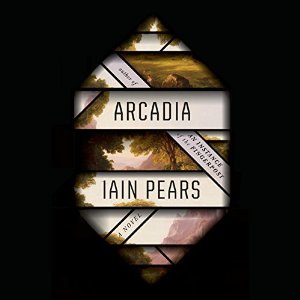 Arcadia by Iain Pears
Arcadia by Iain Pears Narrator: John Lee, Jayne Entwistle
Published by Random House Audio on February 9, 2016
Genres: Fantasy, Science Fiction
Length: 20 hrs 12 mins
Format: Audiobook
Purchase at Bookshop.org or Purchase at Amazon
Add on Goodreads

Three interlocking worlds. Four people looking for answers. But who controls the future - or the past?
In 1960s Oxford, Professor Henry Lytten is attempting to write a fantasy novel that forgoes the magic of his predecessors, J. R. R. Tolkien and C. S. Lewis. He finds an unlikely confidante in his quick-witted, inquisitive young neighbor, Rosie. One day, while chasing Lytten's cat, Rosie encounters a doorway in his cellar. She steps through and finds herself in an idyllic, pastoral land where storytellers are revered above all others. There she meets a young man who is about to embark on a quest of his own - and may be the one chance Rosie has of returning home. These breathtaking adventures ultimately intertwine with the story of an eccentric psychomathematician whose breakthrough discovery will affect all of these different lives and worlds.
Dazzlingly inventive and deeply satisfying, Arcadia tests the boundaries of storytelling and asks: If the past can change the future, then might the future also indelibly alter the past?
First a note on the title, since I’d heard of “Arcadia” but really had no clear knowledge about what it was. And it’s not actually mentioned in the book, I don’t think. Arcadia is a mountainous, landlocked region of Greece. It takes its name from the mythological character Arcas. The Roman poet Virgil recognized that Arcadia’s isolation and bucolic character make it a perfect setting for pastoral poetry. Now English speakers often use arcadia to designate a place of rustic innocence and simple, quiet pleasure. Arcadian can mean “idyllically pastoral” or “idyllically innocent, simple, or untroubled.” Anterworld is our would-be Arcadia, the land Rosie, from the blurb, enters into.
Why did I pick up Arcadia? It embraces things I usually avoid – mainly time-travel, but also science fiction and dystopian and post-apocalyptic societies. Now spies, cheesy romance and fantasy I’m all for. Yes, it does manage to smash all of those together. I also tend to not like audiobooks with two narrators. I picked it up simply because I trust Iain Pears. His Instance at the Fingerpost was great and Stone’s Fall, but I’ve been a fan going back to his lighter Art History Mysteries.
I like the way time works here. The past affects the future, but the future affects the past. You drop the glass so it shatters. The glass shatters, so you had to have dropped it. There were about three time-lines going here. The base is 1960s London, but there are two possible futures. Anterworld and a dystopian world dominated by science and tech where our time-traveling psychomathematician Angela Meerson comes from. I can’t talk to much about the plot, partly because I don’t want to spoil it and partly because it’s a bit complicated, but I thoroughly enjoyed it.
There are lots of characters, but they are all well-drawn and fit into their world. There are those I sympathized with and those I rooted for. Angela is brilliant and abrasive and in over her head. Henry, whose created the idea of Anterworld, guides the spy subplot, and i will say the conclusion to that piece surprised me. Rosie is 15-ish and for all that happens to her, grows quickly from a child to a young woman who is calm and can stand on her own. There are more main characters: Rosie’s love interest, a Robin Hood figure, and his band of men; Angela’s boss and his henchmen; the cat; the Storyteller and Jay, his apprentice; Henry’s government connections; Angela’s daughter Emily who is probably my absolute favorite. All their stories entwine with each other and really it’s fantastic.
It took me a while to get used to the two narrators. Lee does most of the story and Entwistle does the parts that are from Angela’s first-person point of view. Eventually I settled into it, but when Lee did Angela’s voice it threw me off every time, because it didn’t sound like Angela – and I knew what Angela sounded like. It’s a small quibble. Other than that, the narrators did a good job, let me get lost in the worlds.
Arcadia is probably not for everyone. It’s an odd mix of genres and is definitely not linear, but I loved it.
The ending is perfect. You would think it would be tough to wrap everything up in a satisfying way. but Pears manages it. It’s almost as if the ending came first and everything else had to happen to get there.
There’s an app that goes along with it, but since it’s only available on Apple products, I didn’t try it. I guess it kind of lets you choose different paths, almost like you choose the order you want to read the story. Time as a concept is pretty flexible and it seems like the app lets you travel through the story’s character’s timelines in different ways, not the set path the print/audio version takes you. It sounds like a neat concept and had it been available for Android, I totally would have tried it, but alas..

Only on apple, not an app for me then, I like apps 😉
My husband has an iPad and I thought about making him download it for me, but I decided I didn’t actually care that much.
I have been seeing this book around and really want to read it. I have never actually read Iain Pears before. It looks like a book to start with!
I’ve been anting to read him for years. I need to get on it! Glad this one worked for you.